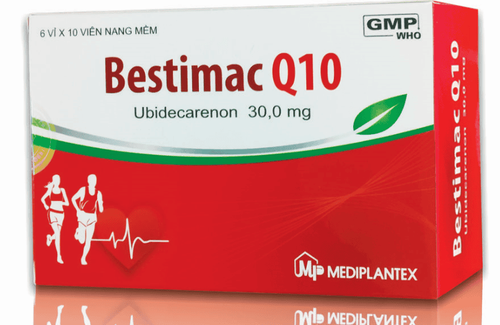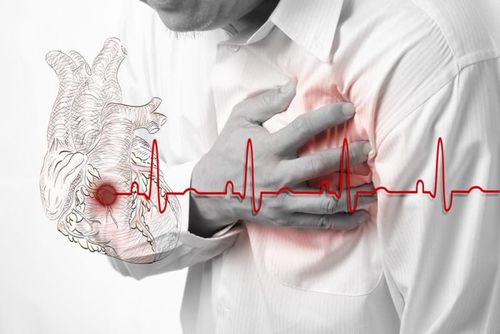This is an automatically translated article.
Congestive heart failure, also known as heart failure, is a dangerous cardiovascular disease that affects the pumping power of the heart muscle. Understanding the definition, causes, risk factors and diagnosis of congestive heart failure will help improve treatment effectiveness and limit serious complications.
1. What is congestive heart failure?
Heart failure, sometimes called congestive heart failure (CCF), is a condition in which the heart muscle is weakened and cannot pump as well as it should. The heart's main pumping chambers (ventricles) can vary in size and thickness, not contracting or expanding as they should. This causes fluid retention, especially in the lungs, lower extremities, and abdomen.
Heart failure is a common disorder worldwide with high morbidity and mortality. It has an estimated prevalence of 26 million people worldwide and contributes to rising healthcare costs worldwide.
Classification of heart failure based on symptoms and left ventricular ejection fraction (LVEF). Heart failure due to left ventricular dysfunction is classified as:
Heart failure with reduced ejection fraction (HFrEF): Heart failure with an ejection fraction (EF) less than 40%. Heart failure with preserved ejection fraction (HFpEF): Heart failure with an ejection fraction (EF) between 40% and 50%. Heart failure with slightly reduced ejection fraction (HFmrEF): Heart failure with an ejection fraction (EF) greater than 50%. Classification of congestive heart failure by location :
Left heart failure . Right heart failure. Total heart failure. Risk factors for heart failure:
Coronary heart disease: Narrowed arteries can limit the supply of oxygen-rich blood to the heart, leading to weakened heart muscle. Myocardial infarction is a form of acute coronary artery disease. Damage to the heart muscle from a heart attack means that the heart can no longer pump as well as it should. Valve disease: Diseases of the heart valves that prevent the heart valves from working properly. thereby increasing the risk of heart failure. High Blood Pressure. Irregular heartbeat: Irregular heartbeats, especially if they are very frequent and fast, can weaken the heart muscle and cause heart failure. Congenital heart disease: Some congenital heart diseases affect the structure or function of the heart. Diabetes: Diabetes increases the risk of high blood pressure and coronary artery disease. certain diabetes medications, non-steroidal anti-inflammatory drugs (NSAIDs); some anesthetics and drugs used to treat high blood pressure... can lead to heart failure. Certain medical conditions such as cancer, blood diseases, irregular or abnormal heart rhythms, nervous system diseases, mental health conditions, lung and urinary problems, infections, viral infections . Abuse of alcohol and tobacco. Sleep apnea: This condition leads to low blood oxygen levels and an increased risk of an irregular heartbeat. Overweight, obese.
2. Diagnosis of congestive heart failure
2.1 Diagnosis by clinical symptoms Main symptoms:Paroxysmal nocturnal dyspnea or dyspnea requiring sitting up. Distended neck veins. Rales in the lungs. Cardiac chamber dilation. Pulmonary edema . Heart sounds T3. Systemic venous pressure > 16 cmH2O. Cycle time > 25 seconds. Cervical hepatic feedback (+). Additional symptoms:
Ankle edema. Shortness of breath on exertion. Cough mainly at night. Large liver. Pleural effusion. Vital capacity is reduced by 1/3 compared to maximum stats. Tachycardia > 120 beats/min. Congestive heart failure is diagnosed when there are 2 main symptoms and 1 major symptom with 2 minor symptoms.
2.2. Laboratory diagnosis Blood tests: Are done to look for signs of diseases that can affect the heart. Chest X-ray: X-ray images can show conditions of the lungs and heart such as pleural effusion, large heart shadow... Electrocardiogram (ECG). Echocardiogram: Shows the size, structure of the heart, heart valves, and blood flow through the heart. An echocardiogram can be used to measure ejection fraction, to show how well the heart is pumping, and to help classify heart failure and guide treatment. Stress tests measure heart health during activity. Computed tomography (CT-scan) or magnetic resonance imaging (MRI) of the chest shows physical damage to the heart. Magnetic resonance imaging (MRI). During a cardiac MRI, you lie on a table inside a long, tube-like machine. Radio waves create images of the heart. Coronary angiography: Evaluation of coronary artery disease. Myocardial biopsy: This test may be done to diagnose certain types of cardiomyopathy that cause heart failure. This diagnostic method is rarely used in clinical practice.
3. Can congestive heart failure be curable?
Currently, there are many methods from medical to surgical that are used to treat congestive heart failure and have shown certain effects.
3.1. Treatment of congestive heart failure by medical methods Clinically, congestive heart failure is treated with a combination of many drugs. Depending on the symptoms, one or more medications may be given, including:
ACE inhibitors : These drugs dilate blood vessels to lower blood pressure, improve blood flow, and reduce pressure force for the heart. Includes: Enalapril , Lisinopril , Captopril ... Angiotensin II receptor blockers: These drugs, including Losartan , Valsartan , Candesartan ... have many of the same benefits as ACE inhibitors. They may be an option for people who cannot tolerate ACE inhibitors. Beta-blockers: They work to slow heart rate and lower blood pressure, while reducing symptoms of heart failure and improving heart function. For example Carvedilol , Metoprolol , Bisoprolol ... Diuretics : Helps prevent fluid from accumulating in the body, because diuretics cause the body to lose potassium and magnesium, your doctor may also prescribe supplements for these minerals . Aldosterone antagonists: Spironolactone, Eplerenone... These are potassium-sparing diuretics. These drugs can raise your blood potassium levels to dangerous levels. Digoxin: Also known as digitalis, increases the strength of your heart muscle contractions. Digoxin tends to slow the heart rate. Digoxin relieves heart failure symptoms in systolic heart failure. Medicines may be given to people with heart rhythm problems, such as atrial fibrillation. Hydralazine and isosorbide dinitrate (BiDil). This drug combination helps relax blood vessels. Used in cases of heart failure where symptoms are severe and ACE inhibitors or beta blockers are ineffective. Vericiguat: This newer medication for chronic heart failure is taken once a day by mouth. Reduced length of hospital stay and mortality from congestive heart failure. Other medications: Examples include nitrates to relieve chest pain, cholesterol-lowering statins, or anticoagulants to help prevent blood clots. 3.2. Surgical treatment Coronary bypass surgery: If the arteries are severely blocked causing heart failure. Repair or replace heart valves. Implantable defibrillator (ICD): Used to prevent complications of heart failure. Cardiac resynchronization pacing therapy (CRT). Ventricular assist devices (VADs). Heart transplant: Indicated for patients with heart failure so severe that surgery or medication does not improve the condition.
4. Is congestive heart failure dangerous?
4.1. Complications of congestive heart failure Complications of heart failure depend on the severity of the disease, the patient's overall health, and other factors. Complications include:
Kidney failure: Heart failure can reduce blood flow to the kidneys, which can eventually cause kidney failure if left untreated. Kidney failure may require dialysis for treatment. Heart valve problems: The valves of the heart that keep blood flowing in the right direction may not work properly if the heart muscle is dilated or if the pressure in the heart is very high due to heart failure. Heart rhythm problems: When you have an arrhythmia, the chambers of your heart don't work properly, which affects your heart's ability to circulate oxygen-rich blood. In addition to not pumping blood properly, arrhythmias can cause blood to stall, increasing the risk of blood clots forming, which in turn travel to the brain leading to a stroke. Liver damage: Heart failure can cause a buildup of peripheral blood that puts too much pressure on the liver. This blood stasis can lead to liver failure and cirrhosis, making it harder for your liver to function properly. Lung function: With congestive heart failure, the heart is unable to get blood in and out of the lungs quickly, which facilitates the return of blood to the lungs. The added pressure on the blood vessels in the lungs can allow blood to accumulate in the alveoli, causing pulmonary edema, which can make breathing more difficult. Reduced energy: Because the heart cannot supply enough oxygen to the body's organs, the patient will not be able to participate in any activity that requires physical exertion. 4.2. Prognosis According to the US Centers for Disease Control and Prevention (CDC), in December 2015 it was reported that the death rate related to heart failure decreased from 103.1 deaths per 100,000 population in 2000 to 89 ,5 in 2009 but then increased to 96.9 in 2014.
In the report it is noted that the trend correlates with the shift from coronary heart disease as the underlying cause of death from heart failure to metabolic diseases and other noncardiovascular causes of congestive heart failure such as obesity, diabetes, malignancies, chronic lung disease, and kidney disease.
Mortality after hospitalization for congestive heart failure is estimated at 10% at 30 days, 22% at 1 year, and 42% at 5 years. This can increase to more than 50% for patients with advanced heart failure.
Mortality rates in patients with heart failure were assessed using the Ottawa scale.
1 point for the following: History of stroke or transient ischemic attack. Oxygen saturation SpO2 < 90% Heart rate > 110 beats/min on the 3-minute walk test. Electrocardiogram changes due to acute ischemia. NT-proBNP level > 5000 ng/L 2 points for the following signs: History of mechanical ventilation because of respiratory failure. Heart rate > 110 beats/min while talking. Blood BUN > 33.6 mg/dl (12 mmol/L) Serum bicarbonate level > 35 mg/day This scale predicts 14-day risk of death, rehospitalization, and acute coronary syndrome in patients with patients to the emergency department with symptoms of heart failure to help develop a safe management plan. Patients with a score of 0 are considered low risk. A score of 1 - 2 is considered medium risk, a score of 3 - 4 is considered high risk, and a score of 5 or higher is considered very high risk.
Congestive heart failure is a dangerous cardiovascular disease with severe complications and a relatively high mortality prognosis. Therefore, early detection of this disease as well as proper treatment will help improve the patient's quality of life, at the same time limit serious complications and contribute to increased life expectancy for patients with congestive heart failure. blood.
Please dial HOTLINE for more information or register for an appointment HERE. Download MyVinmec app to make appointments faster and to manage your bookings easily.













